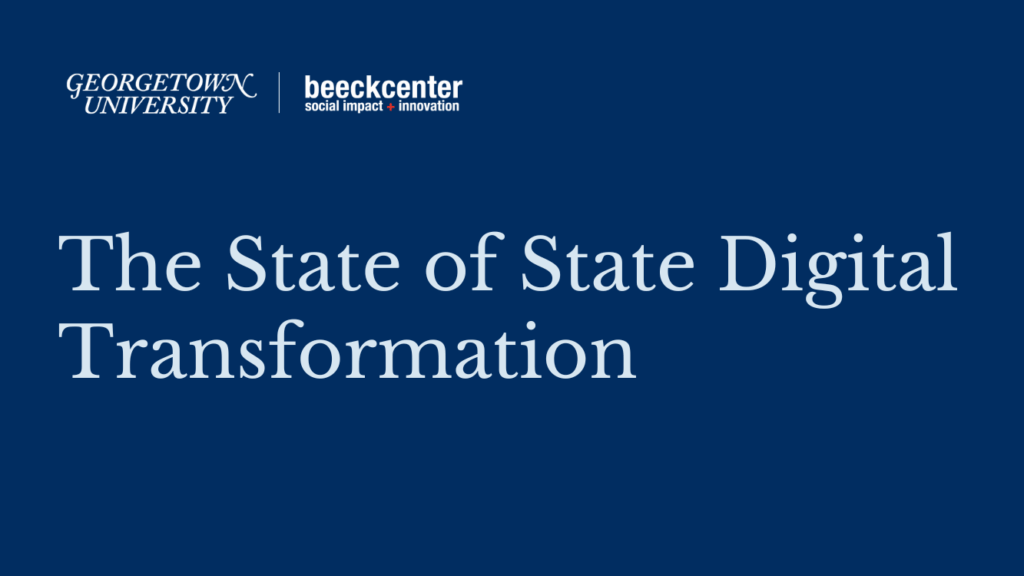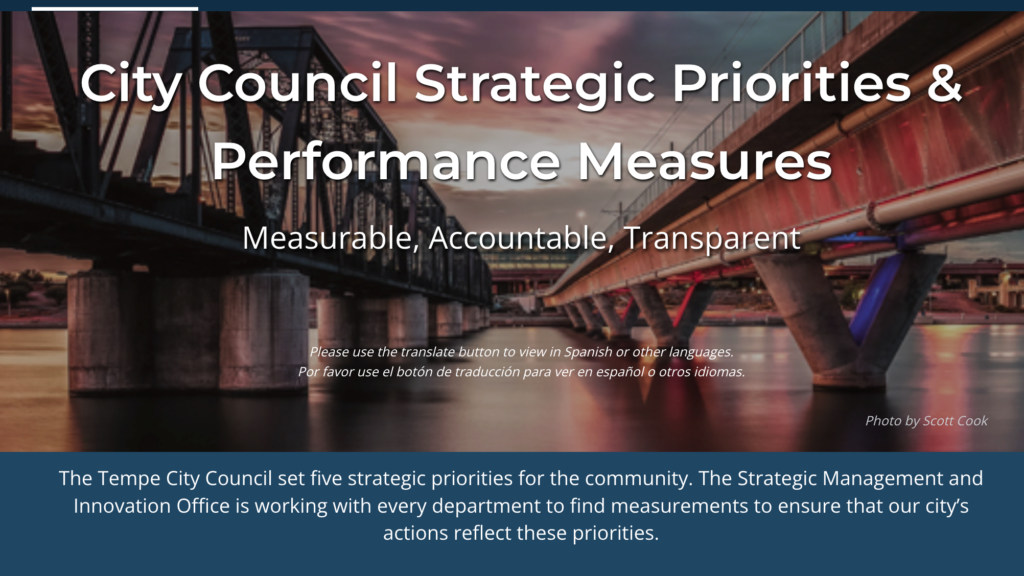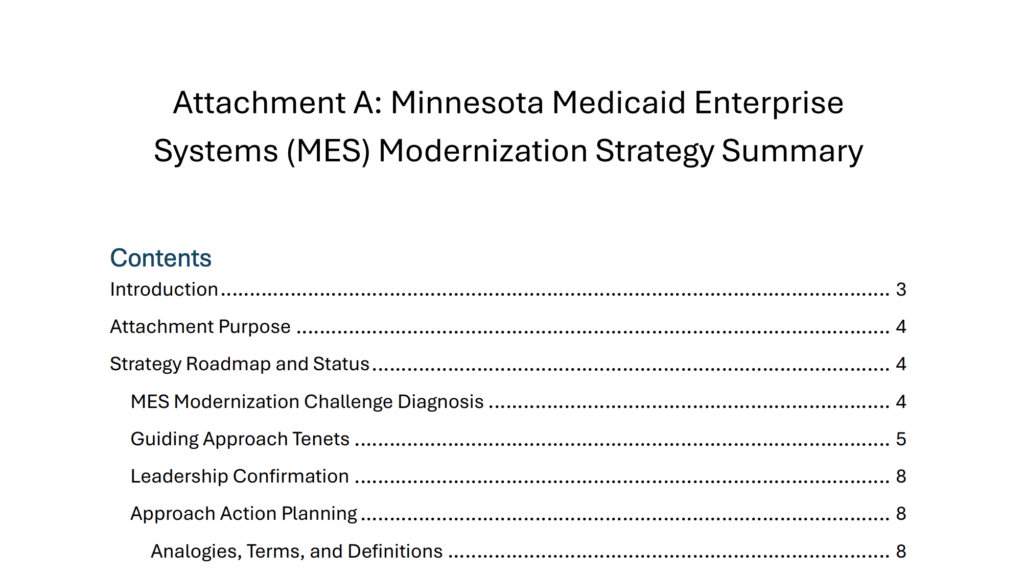The State of State Digital Transformation
Explore The State of State Digital Transformation—your gateway to the Beeck Center’s landscape research into how states are modernizing government operations and services. This interactive map gives public servants, policymakers, practitioners, and researchers a faster, clearer way to glean insights from our research on the policies, teams, tools, and tactics shaping state digital transformation.

U.S. states are steadily rethinking how to deliver government services to better meet the needs of those they serve. From renewing a driver’s license to applying for multiple benefits at once, digital policies, teams, and tools play a critical role in helping states meet service delivery goals. But it can be challenging to get a big-picture view of the approaches different governments are taking.
The State of State Digital Transformation visualization provides that view. By serving as the front door to several strands of Beeck Center research, users can explore the policies, teams, tools, and tactics shaping how states approach digital transformation. Rather than ranking states or declaring “winners,” the map is a starting point for learning about and comparing important dimensions of high-quality digital delivery work in government.
While the map brings new visibility, the landscape of state digital work is ever-evolving. Data availability and quality vary. What we present here is not definitive but directional—a map of a shifting terrain that we will update and expand as our research and understanding grows. We encourage governments to use this tool to explore what is possible and to grow connections.
Interactive Map
The State of State Digital Transformation map brings together multiple streams of Beeck Center research into a single, interactive view. The following Beeck research streams are included in the map:
- Executive Order (EO) and Artificial Intelligence (AI) Legislation Trackers
- Government Digital Service Team (DST) Tracker
- Digital Service Impact Report Tracker
- Chief Data Officer (CDO) Tracker
- Centralized Design System Tracker
Each research stream is described and linked the the Research Context + Methods section below.
This map is designed for public servants, policymakers, journalists, and researchers who want to learn more about the evolving landscape of state digital transformation work. Importantly, the map does not attempt to measure performance, but instead provides an at-a-glance comparative look at various dimensions of digital transformation work across states.
Use the map to:
- Explore executive orders and legislation shaping digital efforts
- Quickly identify which states have digital service teams and impact reports, state chief data officer roles, and centralized design systems
- Dive into the full databases for deeper inquiry
- Submit updates or new records
High-level Takeaways
-
82%
82% (46/56) states or territories have passed at least one EO related to digital transformation since 2013.
-
58%
58% (33/56) states or territories have enacted legislation regulating government’s use of AI since 2019.
-
28%
28% (16/56) states or territories have established a digital service team.
-
14%
14% (8/56) states or territories with digital service teams have reported publicly on
their impact. -
73%
73% (41/56) states or territories have established a chief data officer position.
-
39%
39% (22/56) states or territories have a centralized design system that is live or in-development.
The below table includes an overview of the most active state across all categories (i.e., “yes” for 5+ categories):
| State | EO | AI Legislation | DST | Impact Report | CDO | Design System |
|---|---|---|---|---|---|---|
| California (6/6) | ✔ | ✔ | ✔ | ✔ | ✔ | ✔ |
| Colorado (6/6) | ✔ | ✔ | ✔ | ✔ | ✔ | ✔ |
| Massachusetts (6/6) | ✔ | ✔ | ✔ | ✔ | ✔ | ✔ |
| New Jersey (6/6) | ✔ | ✔ | ✔ | ✔ | ✔ | ✔ |
| New York (6/6) | ✔ | ✔ | ✔ | ✔ | ✔ | ✔ |
| North Carolina (6/6) | ✔ | ✔ | ✔ | ✔ | ✔ | ✔ |
| Connecticut (5/6) | ✔ | ✔ | ✔ | ✔ | ✔ | |
| Delaware (5/6) | ✔ | ✔ | ✔ | ✔ | ✔ | |
| Georgia (5/6) | ✔ | ✔ | ✔ | ✔ | ✔ | |
| Maryland (5/6) | ✔ | ✔ | ✔ | ✔ | ✔ | |
| Minnesota (5/6) | ✔ | ✔ | ✔ | ✔ | ✔ |
Research Context + Methods
The State of State Digital Transformation map draws on a number of research streams conducted by the Beeck Center. This list will continue to expand as the Beeck Center develops additional research products in this space, ensuring the visualization grows as a living resource.
For more specific details on research context and methodology, please visit the relevant publication page:
- Executive Order and Artificial Intelligence Legislation Trackers: Many states have used executive orders to establish digital service offices, data authorities, and more. More recently, legislation regulating AI use by the public sector has emerged as a parallel driver of digital governance. Tracking these actions provides insight into how political leadership determines the landscape of possibility for digital transformation.
- Digital Service Team Tracker and Digital Service Impact Report Tracker: The DST Tracker documents where formal digital service teams exist and how they are structured. The impact report tracker captures how these teams share their progress. Together, these scans illuminate how states are institutionalizing digital service delivery.
- State Chief Data Officer Tracker: The presence of a statewide chief data officer reflects a state’s commitment to using data as an asset. The CDO tracker highlights where CDO roles exist and how their offices are enabled and structured. This landscape helps explain how states govern data, manage privacy, and more—key enabling factors of digital service transformation.
- State-Level Design System Tracker: A centralized design system is a powerful but often overlooked tool for scaling high-quality digital service delivery. These systems support accessibility, reduce duplicative work, and help agencies deliver higher-quality, lower-cost digital experiences that meet people’s needs. This tracker identifies governments that are prioritizing design systems as the foundation of people-centered digital delivery.
Get in touch
If you have questions, ideas, or feedback about The State of State Digital Transformation, or any of the research that informs it, please reach out at digitalgovhub@georgetown.edu. We’d love to hear from you!


